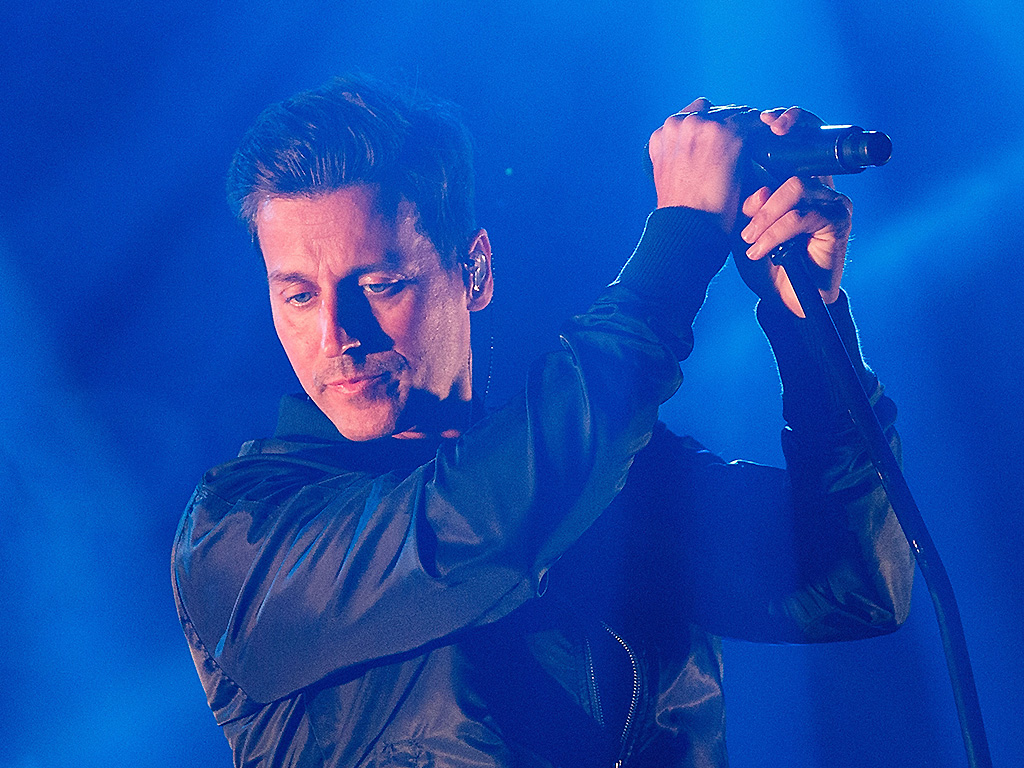Our Lady Peace is one of the biggest bands to ever come out of Canada, and lead singer Raine Maida is the only remaining original member from the group’s formation in 1992.

He’s seen it all: the band’s stratospheric rise during the ’90s with the release of first albums Naveed and Clumsy — the latter hitting diamond status in Canada and easily becoming their most successful — to the group’s unexpected success south of the border, a feat many Canadian bands never achieve.
READ MORE: 8 Canadian music albums to look forward to in 2018
Now, 26 years later, Maida and the current band members — Steve Mazur, Jason Pierce and Duncan Coutts — are being presented with the National Achievement Award at this year’s 29th annual SOCAN Awards ceremony, held June 18 in Toronto, meant to honour the group’s contributions to the Canadian music landscape. Undoubtedly, if you were alive and conscious in the ’90s, you’d be hard-pressed not to list Our Lady Peace as one of the formative music groups of the time.
Global News spoke with Maida over the phone in Los Angeles about the award, and together we reminisced about the olden (golden?) days of alternative rock in Canada.
Raine Maida: It’s one of those things… after this many years, I have to be a bit reflective. [Laughs] I see it in a different light now. I have more gratitude. On this last tour we did in North America, for Somethingness, I think we all felt it — this certain amount of gratitude, getting up on stage and seeing these stadiums and arenas full of people. You think, “Man, this is crazy.”
When you’re younger, you don’t have that concept of a long-term career. As you age, your perception changes, right?
Absolutely, it’s insane. I remember I had a girlfriend from way back in the day ask me, “When are you getting a real job?” Even still, music doesn’t feel like a real job. It’s one of those things, you’re just so blessed to be able to do this, especially this last tour. It’s pretty incredible what we’ve been able to carve out for ourselves. Yes, you pay the bills with it, but it all starts with the song.
For me, it was never about me wanting to be a rock star or get on stage. I was always way more intrigued by the lyrics and writing a song. That’s the passion. That’s where it all begins. To still be juiced about being a songwriter, and feel like you’re still being challenged and growing as a musician, is pretty amazing.
READ MORE: Country band Washboard Union living the dream with 3rd album, ‘What We’re Made Of’
Again, it starts at the song. I think if you’re going to go out there and just play the hits for nostalgia, I get that; a lot of bands make good money that way. But that’s never been … it makes me feel sick in my stomach to be relegated to that. Moving to Los Angeles years ago, and writing and producing for a lot of other people by myself and with my wife [Chantal Kreviazuk] really gives you a different perspective on the craft of songwriting.
And then you spend days with people and you’re like, “This is garbage.” They want to be rock stars, that’s all those kinds of people care about. I think, as long as you have that real passion, it’s a pretty easy path. It’s not easy to stay on, but that’s how I sleep at night.
[Laughs] I moved to L.A. almost 20 years ago, it’s been a long time. But dude, Toronto is still home, for sure. We have a place downtown. Talk about wanting to be in Canada right now! Oh my god. [Laughs] This weekend I was pulling out my hair at all the vitriol and personal attacks on Canada [by U.S. President Donald Trump], it really got me fired up.
Over the years, you’ve had band members come and go, you’ve done some solo stuff, but you’re the nucleus of OLP.
From the beginning it’s been a mix of naivety and dedication. When studios and different companies got involved over the years, you sometimes get inundated with the commerce side of it, and it felt gross, so we went there and then we had to work our way back from it. It’s been this really curvy road, definitely not a straight line.
The Somethingness record we just made, I really think it’s some of the best work we’ve ever done. I don’t think we ever would have ended up here if we kept making the same record, one after another. Probably everyone would have more houses and more money in the bank, but we probably wouldn’t even be together.
WATCH BELOW: Our Lady Peace at Del Crary Park in Peterborough, Ont.

What we grew up with [in the ’90s] … I look back at Canadian bands in the early-mid ’90s, like Rusty, The Gandharvas … there was so much interesting rock music going on, it was a wonderland of all these different sounds and influences that were distinctly Canadian. You didn’t hear that in a lot of other places. Pairing that with growing up in Toronto, when The Edge was CFNY, that’s where I first heard Ned’s Atomic Dustbin, Catherine Wheel, Blur and Radiohead. That’s a profound moment in musical history.
Like anything, it wears out its welcome, and evolves into something else. Looking at hip-hop right now, there’s a lot of it, and it can be overwhelming. My kid played the new Kanye/Kid Cudi Kids See Ghosts album, and it f**king blew my mind. It’s so inventive. It’s hip-hop, and it’s using real instruments again … it actually reminds me of TV on the Radio, one of my favourite bands.
I feel like rock has to make that evolution as well. I think it did. Arcade Fire was really good at taking different elements; you can hear Bowie, you can hear Talking Heads. There were some loud guitars and big beats in those first couple of albums. So yeah, it’s evolving slowly, and it might not get back to where it was, but I don’t know if we want it to. As OLP, we feel the same way.
READ MORE: ‘Dumbo’ trailer: Tim Burton live-action movie revisits classic Disney tale
We played in the first EdgeFest with Blur and Elastica, that was crazy. [Laughs] We were so bad, but it was wild because we were the newbies. It was surreal. I think about that often. We played Live 8 and had the big jam with Neil Young at the end, that was pretty great. Summersault, the festival we started, was also pretty rad.
What are your feelings about being nominated by SOCAN for this award?
The whole music business is, usually … consumer-facing, anyway, for our fans … they know your manager, your agent. SOCAN is sort of a hidden entity. Nobody talks about the rights organization that collects the money for you. When you look at it that way, that’s pretty important. SOCAN is a non-profit and very supportive of Canadian artists. They’re very crucial when you look back on the career of any Canadian artist.
It’s great that they’re recognizing us, but it’s a bit of us recognizing them as well. Paying respect and gratitude to the fact that they go to all the corners of the world and help us get money for the songs we write. So thank you.





Comments